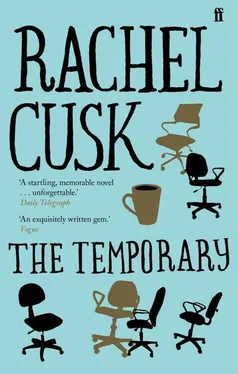Rachel Cusk - The Temporary
Здесь есть возможность читать онлайн «Rachel Cusk - The Temporary» весь текст электронной книги совершенно бесплатно (целиком полную версию без сокращений). В некоторых случаях можно слушать аудио, скачать через торрент в формате fb2 и присутствует краткое содержание. Год выпуска: 2013, Издательство: Faber & Faber, Жанр: Современная проза, на английском языке. Описание произведения, (предисловие) а так же отзывы посетителей доступны на портале библиотеки ЛибКат.
- Название:The Temporary
- Автор:
- Издательство:Faber & Faber
- Жанр:
- Год:2013
- ISBN:нет данных
- Рейтинг книги:5 / 5. Голосов: 1
-
Избранное:Добавить в избранное
- Отзывы:
-
Ваша оценка:
- 100
- 1
- 2
- 3
- 4
- 5
The Temporary: краткое содержание, описание и аннотация
Предлагаем к чтению аннотацию, описание, краткое содержание или предисловие (зависит от того, что написал сам автор книги «The Temporary»). Если вы не нашли необходимую информацию о книге — напишите в комментариях, мы постараемся отыскать её.
The Temporary — читать онлайн бесплатно полную книгу (весь текст) целиком
Ниже представлен текст книги, разбитый по страницам. Система сохранения места последней прочитанной страницы, позволяет с удобством читать онлайн бесплатно книгу «The Temporary», без необходимости каждый раз заново искать на чём Вы остановились. Поставьте закладку, и сможете в любой момент перейти на страницу, на которой закончили чтение.
Интервал:
Закладка:
Her last job had been a two-week assignment to a dingy little office behind Waterloo station — normally she only worked in the City, and she was sure Lynne had sent her on this job to get her back for the one before, where she hadn’t left on very good terms and they’d complained to the agency — working for a fat man called Mr Harris, who wore brown shirts with stains dotted like islands over the expanse of his belly. She didn’t know what Mr Harris did, even at the end of her two weeks. The business of the companies she worked for rarely had any bearing on the work she was expected to do. Mr Harris received few telephone calls and his correspondence was featureless. She spent most of her time typing long lists of figures and addresses into a database.
She was alone in the office with Mr Harris, and the slack pace of trade meant that he was obsessed with everything she did, rushing over to her desk when she opened a file or typed a letter to make sure she was doing it properly.
‘You’ll get the hang of it,’ he would say encouragingly, while Francine prickled with irritation beside him. He would stand too close to her, his open mouth emitting clouds of rancid breath, and often a tiny rain of saliva would spatter across her desktop. He watched her continually, making comments about her mood and habits or the expression on her face.
‘You like your coffee,’ he would nod if she got up to make a cup. He would offer her biscuits, custard creams which he kept in a drawer, and she would refuse them. ‘That’s how you keep your nice slim figure, isn’t it, Francine?’
Normally Francine found it easy to understand her life at the office. Her rank and station were clear, her duties and regalia always the same, her employer a distant, regimental figure whose peculiarities were generally substantial enough to be discussed at lunch-time. The band of her cohorts was genial, and usually manufactured a set of easily grasped distinguishing features on the surface of a deep homogeneity. Every office was at pains to possess its own character: ‘What do you think of this place, then?’ people would ask Francine at the end of her first day, and although she never really thought anything, they would proudly tell her that she would get used to it in the end.
With Mr Harris, though, Francine had begun to feel as if she didn’t know who she was. Without the armour of a corporate identity, she had felt him clawing at her person, simulating a hideous intimacy which for the first time revealed to her the precarious contract on which her position was founded. Her transience normally safeguarded her liberty, but locked in with Mr Harris’s fascination the days had seemed long. His presence had become hourly more predatory, and although Francine knew that the termination of his lease on her was not far off, the fingering, probing quality of his ownership subdued her into the belief that it would never end. She became listless in the evenings, avoiding her reflection in the windows of the Underground train as she made her lonely journey to Waterloo the next morning. At the end of two weeks he asked her to stay on and she said that she had another job to go to the next week. She didn’t tell Lynne what she had done.
‘I’m sorry about that, Francine,’ Mr Harris had said, drawing close to her as she stood straining at the door with her coat. His skin was stodgy and pale, and his eyes quivered like tinned fruits in the jelly of his face. ‘It’s meant so much to me having you here.’
Afterwards Francine had hurried down to the station, the grim scenes of her unhappy lunch hours clinging to her as she passed. It had taken a long time for the elation at her freedom to come, and she had only really felt it when Lynne phoned to tell her about the job at Lancing & Louche and sounded quite friendly, as if nothing had happened. She had even said that they only sent their top people to Mr Lancing, although in her sensitive condition Francine had detected a note of warning in the compliment.
She turned on the kitchen lights and put her bag on the table. Janice had left dishes in the sink, minutely and elegantly smeared, and a carton of milk stood open on the sideboard. A note on the table said that she had gone out for the evening. Irritation provoked a tightening in Francine’s head, and she felt the slight tumult in her stomach which was the residue of being unable to distinguish her thoughts by discussing them with someone else. She never really assumed control over events until she had related them in some form: untold, their reality was too pressing, still sullied with the awkwardness of the moment. Once she had presented them to an audience, they came back to her purged and confirmed, interpreted, ordered scenes which could then be filed in memory. Given the unsociable nature of her day, she had hoped Janice would be on hand when she arrived home. She remembered that it was Friday night, and the thought of spending it alone worried her for a moment, until she conjured up the dispensation of her activities the night before. She was recovering, and would prove it with a long, scented bath, an arsenal of beauty treatments, and a relaxed posture later on the sofa with a magazine.
Thus intent, Francine visited the sitting-room en route to her indulgences and listened to the messages on the answering machine. Two were for Janice, one of them the imperious manager of the Hampstead boutique, the other a man with a rough voice saying something that Francine couldn’t hear very well. Her mother’s clearer, complaining tones followed, asking why she had to have that silly machine on the whole time and would madam like to phone her when she got in, although not if it was past ten o’clock. Then it was Ralph, saying that he’d enjoyed last night and he hoped she hadn’t felt too awful at work because he certainly had. His voice sounded incongruous and polite beside the others.
Francine immediately began the business of not returning Ralph’s call, going into the bathroom and turning on the taps. She looked in the mirror above the sink and was surprised to see that her face was haggard beneath an unfamiliar mat of lank hair. The idea that Ralph had wrought this change with the pummelling effect of his attention — wanting to talk to her before she’d even walked through the door! — was interesting, but the seeds of melodrama were blighted by the realization that his message had contained no suggestion that he wanted to see her again. In the more productive state of mild uncertainty, she removed her tired, twice-worn clothing and set about the lavish business of restoring herself while fingers of steam began to creep warmly over her skin.
In the bath, she reflected on the fact that her mother had lately seemed to be enjoying a new lease of life, which, while it didn’t succeed in blunting the voracity of her interest in Francine’s affairs, suggested the renewal of activity in her own. Francine didn’t think about her parents very often, having some time ago realized that the profitability of her association with them would never again reach the modest peaks of her childhood years — unless they died, of course, which was a horrible thought — but she did occasionally solicit her mother’s attention, and maintained a relationship with her over the telephone which was useful in times of shortfall, when other confidantes could not be located or were found wanting. Maxine Snaith’s appetite for information was considerable, and allowed Francine the rare luxury of being asked more questions about herself than she really wanted to answer.
Her parents had never visited her in London, and although they frequently mentioned the fact that there was always a bed for her in Kent, both parties seemed to consider the terms of Francine’s emigration so extreme as to lend her absence a certain finality. Since Frank, Francine’s father, had taken his retirement, a journey to London had been mentioned more frequently, but Francine had soon discovered that the foreign flavour of the idea made it easy to forestall. If the disincentives of bombs and bad weather failed, she could always say that she was very busy at that particular time, and Maxine would grow meek with awe and with the possibility of encountering things that she didn’t understand, making a trip later in the year sound much more acceptable.
Читать дальшеИнтервал:
Закладка:
Похожие книги на «The Temporary»
Представляем Вашему вниманию похожие книги на «The Temporary» списком для выбора. Мы отобрали схожую по названию и смыслу литературу в надежде предоставить читателям больше вариантов отыскать новые, интересные, ещё непрочитанные произведения.
Обсуждение, отзывы о книге «The Temporary» и просто собственные мнения читателей. Оставьте ваши комментарии, напишите, что Вы думаете о произведении, его смысле или главных героях. Укажите что конкретно понравилось, а что нет, и почему Вы так считаете.












